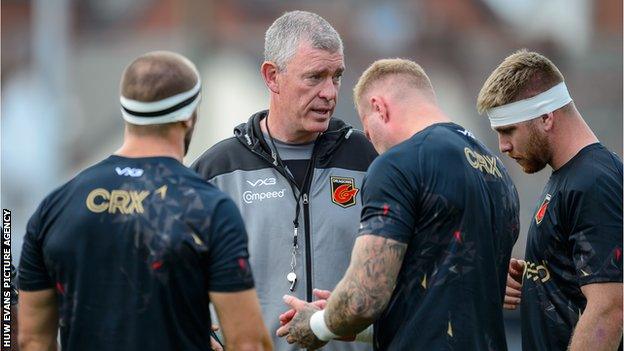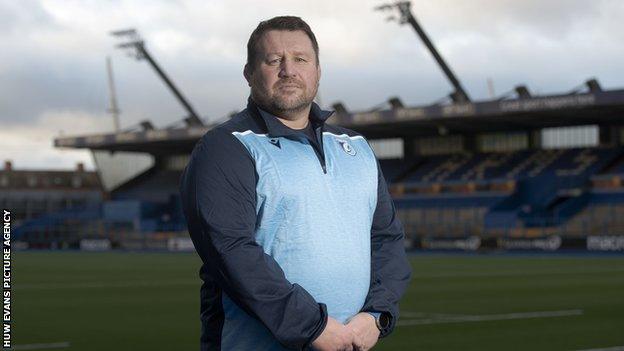Dean Ryan: Dragons director of rugby calls for 'overarching strategy' for Welsh rugby
- Published

Dean Ryan was appointed Dragons director of rugby in 2018
Dragons director of rugby Dean Ryan has called for Welsh rugby to implement an "overarching strategy" to help revive its domestic professional game.
Wales' regions lost all 11 of their European matches played this season.
Cardiff director of rugby Dai Young says Wales' recent international success has been "papering over the cracks" of the domestic game.
"There has to be a binding strategy that brings us all together," said Ryan.
"If now, with the challenges we face, is the moment that aligns people, then that would be a great outcome for Welsh rugby.
"There are lots of ways to look at being more effective with the resources we've got but that requires an overarching strategy we're all working towards.
"That's not been the case. There are a number of working groups trying to find what those answers are but unless you have an overarching direction that binds all five entities together, it's going to become difficult.
"What we've got is a number of regions all trying to be successful in their own situations."
Dragons lost three Challenge Cup games and have suffered nine losses in 10 competitive matches this season.
That is symptomatic of a wider malaise in Welsh domestic rugby, which is at odds with the fortunes of the national team, who are reigning Six Nations champions and have won four Grand Slams in the past 17 years.
Ryan says the success of the Wales team cannot come at the expense of the regions.
"Any time you focus on one part, you're going to neglect other parts and the game in Wales needs all parts working well," he added.
"As it moves forward, it will need competitive sides to create competitive experiences and stepping stones to international rugby.
"The moment you shine a light on one fifth of an area, you're neglecting others.
"Wales needs the regions and the regions need Wales. We need to find that overarching strategy that binds us all together."
Ryan says a number of factors have to be considered, adding: "There are many things and I don't think I'd do it justice to try and answer it all here.
"Funding gets the headlines but that's not the only part. The effective use of resources, the pathways to competitive experiences - there are so many subjects.
"Many of them are talked about and I've been in a number of meetings where they have been discussed.
"But there has just never been a strategy that has bound us all together. It would be wrong to cherry-pick a situation. It is multi-layered and requires an overall review to work forward."
'Papering over the cracks'
Young is in his second stint with Cardiff having returned from Wasps. He led Cardiff to a Challenge Cup title in 2010 and his side will be in the last 16 of Europe's second-tier competition when it resumes in April.
Their Champions Cup campaign this season was severely affected by Covid. When Cardiff played Toulouse and Harlequins in December, the Welsh side were without 32 players who were forced to quarantine on their return from South Africa, as well as a further 10 because of injury and suspension.

Dai Young captained Wales in rugby league and rugby union
Cardiff's makeshift team - made up of academy players, semi-professionals and a handful of Wales internationals - performed admirably but lost both games before also losing at home to Harlequins.
"Looking from the outside in because I've only been back a year - the regions have struggled for a couple of seasons now, it's not something that's just happened this season," said Young.
"It seems to me Wales doing well papers over the cracks a little bit. The only way things will probably change is if Wales don't do well, which none of us want.
"Things seem to be rolling on exactly the same because we've had success with Wales. Everybody understands it's not an easy or quick fix, but something has to change.
"People are tasked with working out how to change it for the better. I'm sure that's something being talked about but talking needs to turn into actions.
"I haven't heard of any action that's going to be taking place in the medium or long term."
Strength in depth issues
Scarlets and Ospreys are out of Europe after finishing bottom of their respective Champions Cup pools.
Scarlets only played two games in the tournament which both ended in heavy defeats, against Bordeaux-Begles and Bristol.
They remain the only Welsh side since 2011-12 to qualify for the knockout stages when they reached the semi-finals in 2018.
"It is disappointing and that is not a good enough statistic," said Peel.
"We need to understand where we are with the performance side of things. Munster, Leinster and Ulster have been competitive within the competition [Europe] and these are sides we regularly compete with in the URC [United Rugby Championship] or Pro14 over the last couple of years.
"There is a lot of work that needs to be done through the young level moving up. I saw the Bristol bench, there were two All Blacks and English internationals coming off the bench and that's the reality.
"All I can do is look internally at what we can do. We need to look at everything from bottom up in terms of what we do with our kids, what type of player we want to produce.
"That's ongoing with us. I'm new to the job so understanding what goes on behind the scenes is important, and the way we want to drive it.
"Retention and recruitment is important as well. Allowing and exposing young players to play is something we've talked about.
"We need more exposure for our young players so when we come up to that level, we're more exposed to it."

Toby Booth took over at Ospreys in the summer of 2020
Ospreys finished without a match point after suffering three European defeats and head coach Toby Booth accepts there is a financial element to developing bigger squads.
"People have said to me before, if you want to be a successful coach you have to get good players," said Booth.
"They cost a lot of money so if you can't afford to buy them, you have to make them.
"There is a balance because we have a lot of good players who are injured. We are not making excuses here. We have got what we have got and we have to work with that.
"Strength in depth is without the doubt the difference and we need to bridge that gap. The wage cap is coming down in England, so can they maintain things, who knows?
"Finances often determine the success for the now, whereas a long-term approach and growing your own hopefully alleviates that in the future."
Wales head coach Wayne Pivac highlighted the importance of the national side with a lot of Welsh rugby revenue coming from the international game.
"I think it's common sense the Welsh national team needs to perform because it's the cash cow for the game in Wales," said Pivac, who is also a former Scarlets coach.
"It's probably not the time for me to be wading into that conversation. It's safe to say there's been many conversations going on around the subject since I arrived in Wales.
"It's not a new one. It's not one that will probably go away overnight. We're certainly focused on the job in hand and the group of players we have.
"We've got enough to worry about. That's something that will probably be discussed at a later date."